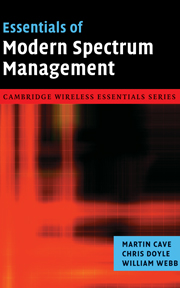Book contents
- Frontmatter
- Contents
- Acknowledgements
- I Emerging problems with the current spectrum management approach
- II Markets
- III Regulation
- 11 Incentive based spectrum prices: theory
- 12 Incentive based spectrum pricing: practicalities
- 13 How the commons works
- 14 Commons or non-commons?
- 15 Is public sector spectrum management different?
- 16 Are developing countries different?
- IV Conclusions
- Further reading
- Abbreviations
- Author biographies
- Subject index
- References
11 - Incentive based spectrum prices: theory
Published online by Cambridge University Press: 13 August 2009
- Frontmatter
- Contents
- Acknowledgements
- I Emerging problems with the current spectrum management approach
- II Markets
- III Regulation
- 11 Incentive based spectrum prices: theory
- 12 Incentive based spectrum pricing: practicalities
- 13 How the commons works
- 14 Commons or non-commons?
- 15 Is public sector spectrum management different?
- 16 Are developing countries different?
- IV Conclusions
- Further reading
- Abbreviations
- Author biographies
- Subject index
- References
Summary
Introduction
In earlier chapters we have stated that there is a need for, and a benefit associated with, regulating radio spectrum use. In practice the costs of regulation are typically recovered through licence fees paid by radio spectrum users and hence there is a price associated with the use of licensed radio spectrum. For example, in the USA the FCC applies two types of fees – application fees and regulatory fees which cover the administrative cost of managing the use of spectrum, respectively. They may also serve to discourage the filing of frivolous applications. If set too high, however, fees can result in under-utilisation of the spectrum, while if set too low hoarding and congestion may arise.
The simple recovery of administrative costs via licence fees, while practised by almost every spectrum management agency around the world, fails to make use of one of the most powerful incentive mechanisms available to encourage more efficient use of radio spectrum. By varying licence fees in a suitable way, a spectrum manager can improve the economic and technical efficiency of spectrum management. The setting of incentive based prices is especially attractive in circumstances where spectrum has been assigned and/or allocated via administrative means rather than auctions. Incentive based pricing also works well in the absence of secondary trading, but as we show in this chapter, it can also work alongside spectrum trading.
Licence fees are a potent means of achieving greater efficiency for radio spectrum licensees holding non-auctioned spectrum.
- Type
- Chapter
- Information
- Essentials of Modern Spectrum Management , pp. 167 - 186Publisher: Cambridge University PressPrint publication year: 2007



